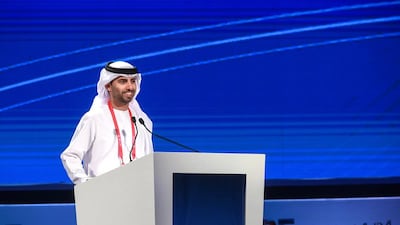Countries within the Commonwealth of Independent States should pass laws that will help to improve the investment climate to bring in more international funding, said the UAE’s Minister of Energy Suhail Al Mazrouei.
During his keynote address at the CIS Global Business Forum, which took place in Dubai on Wednesday, Mr Al Mazrouei said that the decline in hydrocarbon prices “puts lots of pressure” on CIS states that are generally exporters of oil and gas.
“But I think there are opportunities, and those are to look at the full value chain. To look at attracting investments in your countries where you utilise each barrel and each molecule of gas before it is exported,” he said, citing the strides that had been made in the US, Canada and elsewhere converting shale gas into petrochemicals.
“But for major investors to come, you need also to work more [on] regulations. In the UAE, we found the best way for us to grow and invest is to sign some important treaties. Some tackle the tax issue [to prevent] double taxation, and some tackle the protection of investment. Those are the kind of things I would advise you to consider.”
Mr Al Mazrouei said that CIS states should also focus on the diversification of their energy resources to reduce reliance on natural gas so that it can be channelled towards industry, citing the UAE’s own target of cutting gas use for energy by 30 per cent by 2030.
He added that he was willing to work with CIS countries and “share what knowledge we have” to assist, with a view to recreating the “Silk Road” East-West trade through the UAE.
Majid Al Ghurair, the chairman of Dubai Chamber, said that non-oil trade between Dubai and the CIS states grew from Dh15.5 billion in 2012 to Dh20.8bn in 2014. In the first half of last year, trade between the two sides was Dh7.8bn.
“The CIS markets with their geographic and economic size offer a potentially lucrative business perspective for UAE and Gulf-based businesses,” said Mr Al Ghurair.
Last month, the IMF stated that the CIS countries had been “caught in the slipstream” of Russia’s recession. It said the Russian economy would shrink by 1 per cent this year, and in the other CIS states GDP would remain flat, before recovering next year to post growth of 1.7 per cent.
At yesterday’s conference, the energy minister would not be drawn into making comments about Tuesday’s proposal by Saudi Arabia, Russia, Qatar and Venezuela for oil producers to freeze output at January levels to prop up prices.
However, in remarks on Twitter yesterday, he said that the country’s oil policy was open to cooperation with all producers towards the mutual interest of market stability.
He also said the UAE was optimistic about the future.
Whether the plan is enough to put a floor under prices is uncertain. The proposal depends on cooperation from a range of producers, including Iran.
mfahy@thenational.ae
* With agencies


